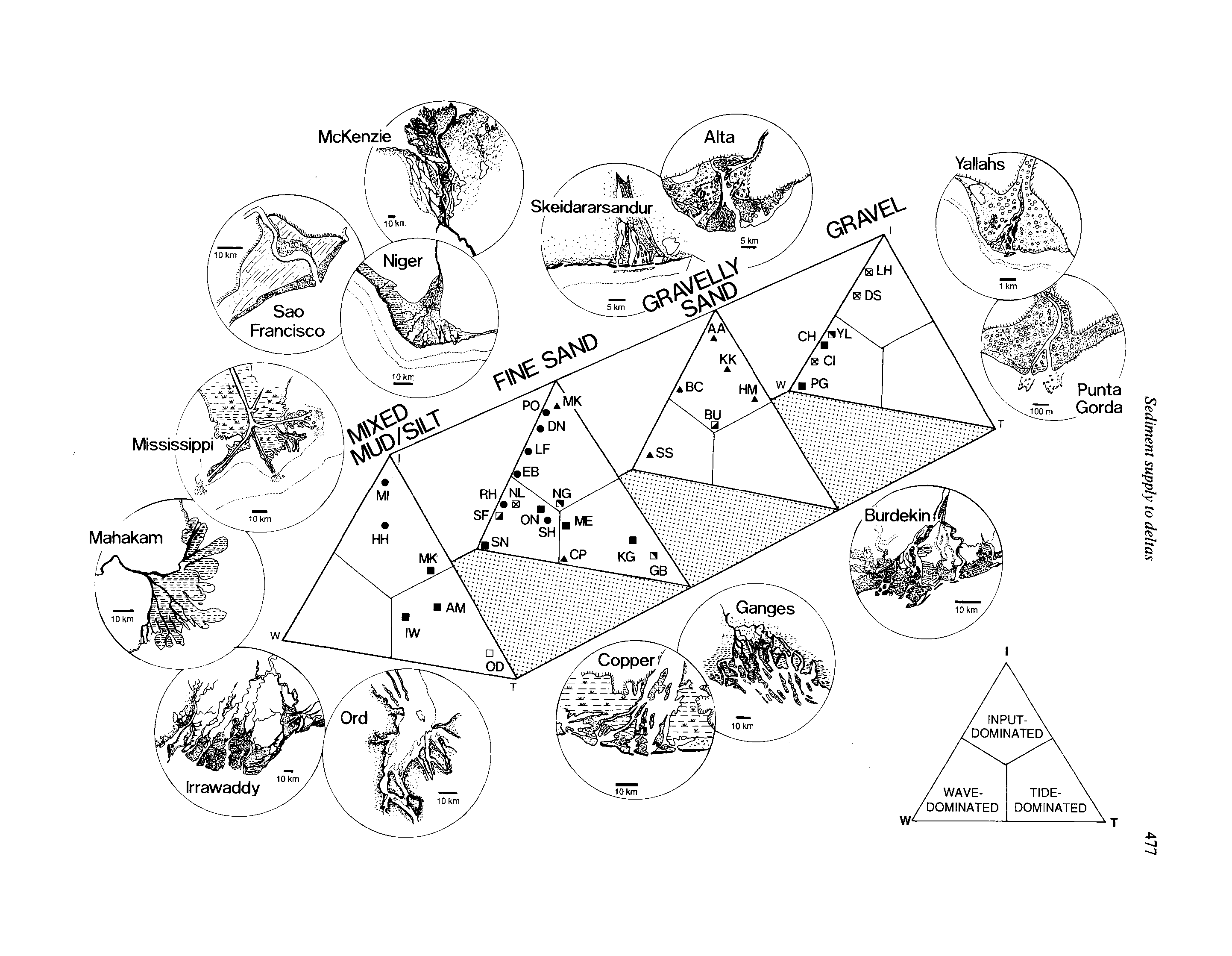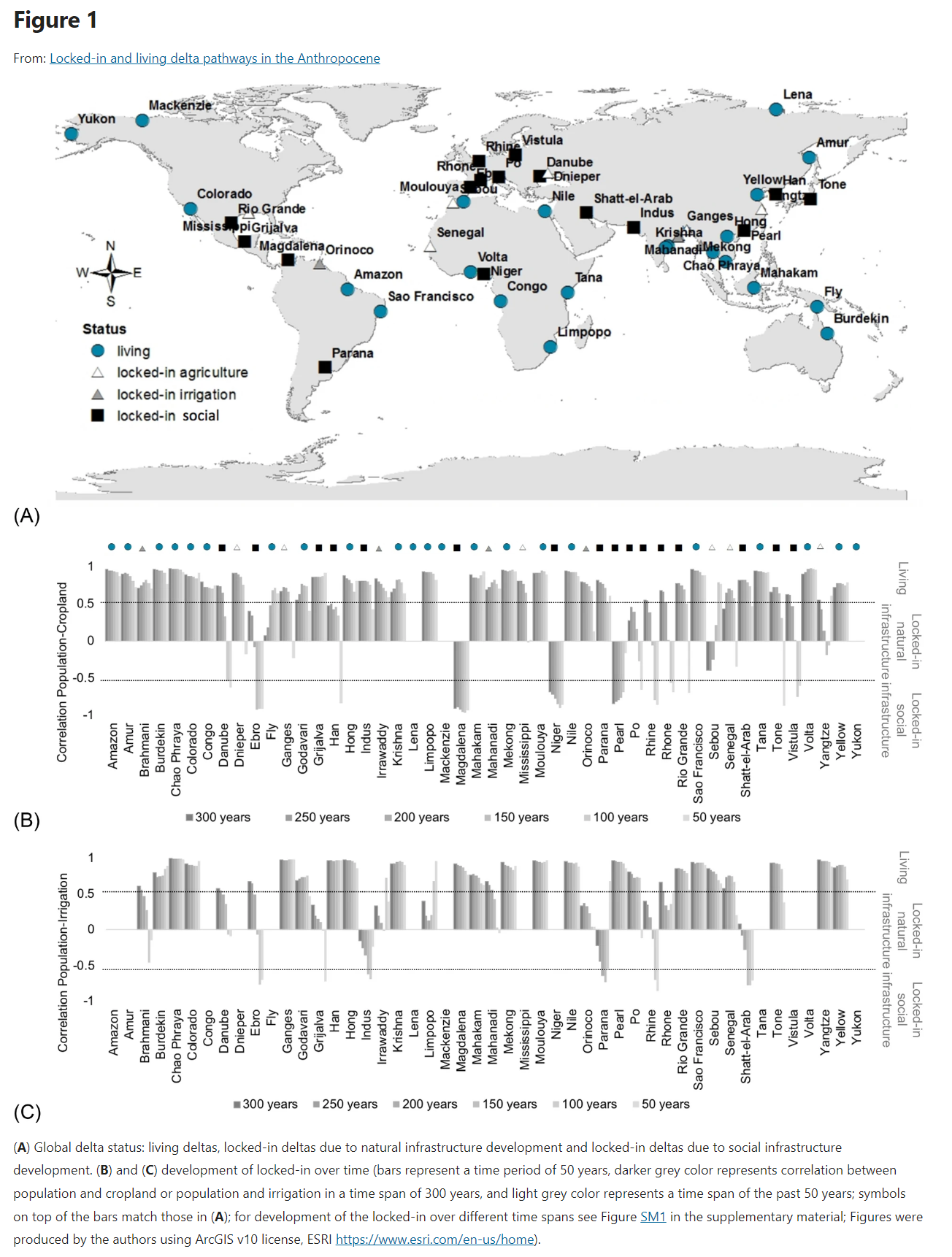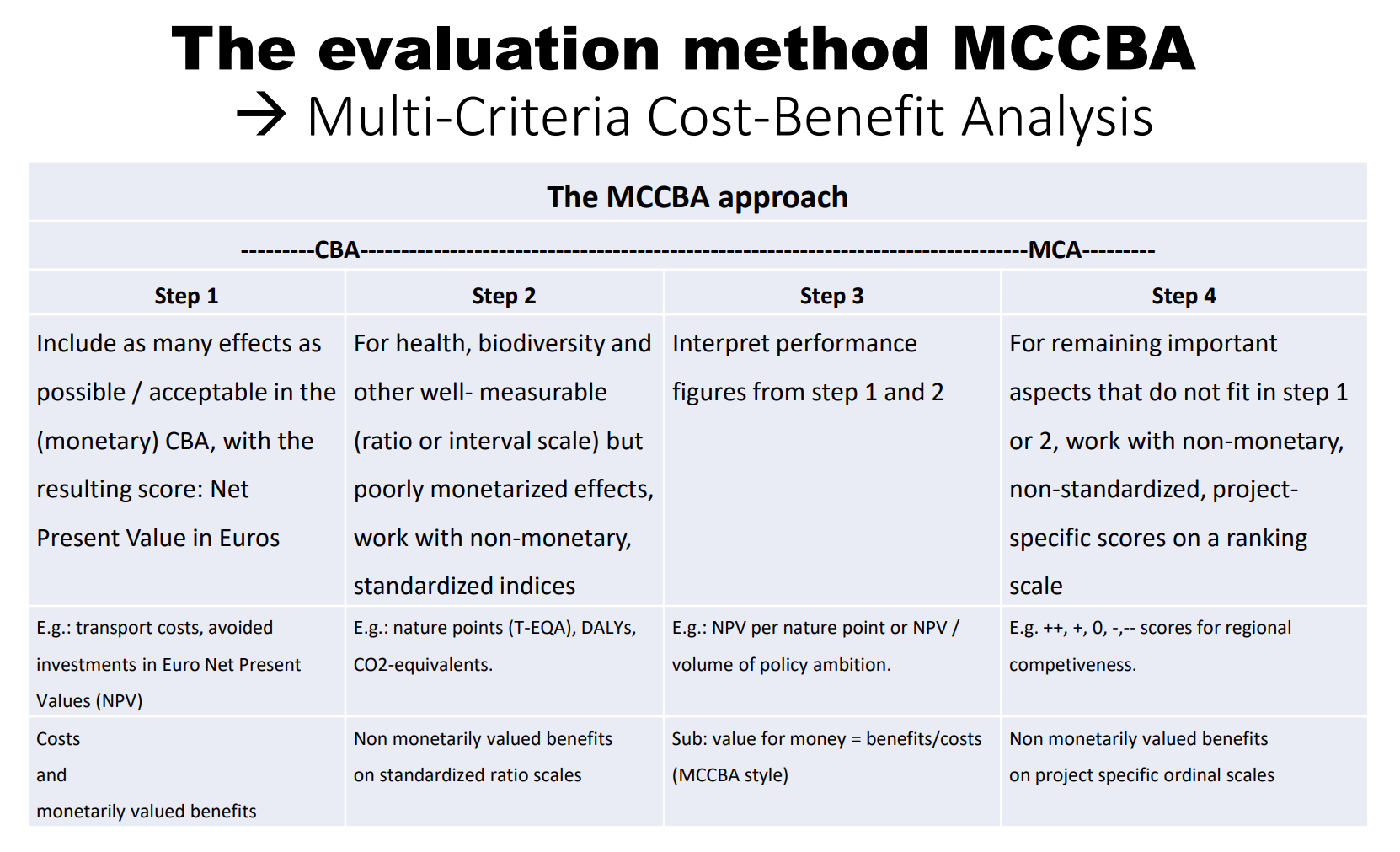Deltas
This note is about a potential project about river deltas (estuaries, etc.).
Key Definitions and Themes
Existing and emerging definitions and interpretations (to be expanded and systematised).
For the background: Delta | National Geographic Society
"A delta is a discrete bulge of the shoreline formed at the point where a river enters an ocean, sea, lake, lagoon, or other standing body of water." 3
Types of deltas by the processes that control the build-up of silt:
- wave-dominated
- tide-dominated
- Gilbert deltas
- estuarine deltas
- storm-flood-dominated 5

Orton, G. J., and H. G. Reading. ‘Variability of Deltaic Processes in Terms of Sediment Supply, with Particular Emphasis on Grain Size’. Sedimentology 40, no. 3 (1993): 475–512.
Produce an extended diagram adding more-than-human/cultural considerations and extending through time?
For an overview in relation to humans:
Bianchi, Thomas S. Deltas and Humans: A Long Relationship Now Threatened by Global Change. New York: Oxford University Press, 2016.
What is a River?
Laborde, Sarah, and Sue Jackson. ‘Living Waters or Resource? Ontological Differences and the Governance of Waters and Rivers’. Local Environment 27, no. 3 (2022): 357–74. https://doi.org/10/gp9p3m.
For a precedent, see: Rivers. Water/Human Rights. Beyond the human? Indigenous water ontologies. Plurilegal Encounters. Interlegal Translation
Clark, Cristy, Nia Emmanouil, John Page, and Alessandro Pelizzon. ‘Can You Hear the Rivers Sing? Legal Personhood, Ontology, and the Nitty- Gritty of Governance’. Ecology Law Quarterly 45 (2019): 787–844.
Parsons, Meg, Karen Fisher, and Roa Petra Crease. ‘Legal and Ontological Pluralism: Recognising Rivers as More-Than-Human Entities’. In Decolonising Blue Spaces in the Anthropocene: Freshwater Management in Aotearoa New Zealand, edited by Meg Parsons, Karen Fisher, and Roa Petra Crease, 235–82. Cham: Springer, 2021.
Related Terms
A list of search and technical terms highlighting related bodies of knowledge.
-
ichnology: organism-substrate interactions in space and time
-
stratigraphy
-
sedimentology
-
moral ecologies 1
-
wetland restoration
-
source to sink
-
morphohydrolics
-
hydronarratives
Overview
Some information on the current state and prospects.

Santos, Maria J., and Stefan C. Dekker. ‘Locked-in and Living Delta Pathways in the Anthropocene’. Scientific Reports 10, no. 1 (2020): 19598. https://doi.org/10/grh2c5.
Data and Information Sources
Examples of Functions
- Provide ecosystem services.
- Filter water.
- Have high ecological productivity.
- Attractive to wildlife because the nutrient-rich waters lead to increased plant growth and food availability.
- River deltas and estuaries are significant coastal landforms. Nearly 600 million humans live in river deltas.
- Dynamic and vulnerable environments (this is an interesting point because deltas intensify biological and cultural innovation/change; as such they can provide lessons that can scale to other regions and situations).
Some important/interesting roles of deltas (to be extended and systematised):
- Nutrient supply (Kongo supplying most of South Atlantic with iron)
- Ocean currents (as they are determined by the rivers)
- Biological dispersions (apes and monkeys travelling to South America from Kongo)
- Amazon and other rivers over-fertilising the oceans leading to Sargasso plants
Significance of This Research
Why is research on deltas needed and what are the benefits of this framing (consider other bounds: fresh/salty interfaces, other fluvial patterns, types of bioregions, cultural regions, etc.)
- Future of coasts 2
- Sinking of deltas
- Warming waters (e.g., Hobart is warming much faster than average)
- Confining management that prevents autonomy (defensive, etc.)
- Restoration of deltas
Issues, Problems, and Gaps in Knowledge
- Many Late Holocene deltas have moved from a growth phase to a sinking phase during the Anthropocene.
- A mean 76 ± 16% drop in hydraulic energy occurs in all deltas and drives an ever-decreasing bed-material transport.
Syvitski, Jaia, Edward Anthony, Yoshiki Saito, Florin Zăinescu, John Day, Janok P. Bhattacharya, and Liviu Giosan. ‘Large Deltas, Small Deltas: Toward a More Rigorous Understanding of Coastal Marine Deltas’. Global and Planetary Change 218 (2022): 103958. https://doi.org/10/grdzxm.
- River deltas globally might lose 5% (∼35,000 km2) of their surface area by 2100 and 50% by 2300 due to relative sea-level rise under a high-emission scenario.
Nienhuis, Jaap H., Wonsuck Kim, Glenn A. Milne, Melinda Quock, Aimée B.A. Slangen, and Torbjörn E. Törnqvist. ‘River Deltas and Sea-Level Rise’. Annual Review of Earth and Planetary Sciences 51, no. 1 (2023): 79–104. https://doi.org/10/grdzxn.
-
Most of today's deltas are restricted to an irreversible path towards unsustainability 7
-
There is a lack of integrative and multi-scale studies of deltas, partly because they are so large-scale and complex. "Small-scale studies in a single delta dominate the literature and that there is a lack of multi-risk and multi-level studies." 8
-
Deltas are too complex to model 7 (justifying a process-based rather than the outcome-based approach, cf. process ethics, democratic experimentalism, anarchism, grass-roots and bottom-up approaches)
Multiple co-existent frameworks hesitate between sustainability, resilience and - abandoning those - adaptation, transformation, transition, etc.
Best, Jim. ‘Anthropogenic Stresses on the World’s Big Rivers’. Nature Geoscience 12, no. 1 (2019): 7–21. https://doi.org/10/gfrfbz.
Edmonds, Douglas A., Rebecca L. Caldwell, Eduardo S. Brondizio, and Sacha M. O. Siani. ‘Coastal Flooding Will Disproportionately Impact People on River Deltas’. Nature Communications 11, no. 1 (2020): 4741. https://doi.org/10/gjgxrn.
Principles
Commit to:
- Future-oriented ethics to frame all methods of the project (care-based ethics, process ethics, ecocentrism).
- Distinct and innovative methods that are likely to produce unusual results.
- Place-based research.
- Epistemological inclusivity, including Indigenous/Aboriginal worldviews and nonhuman cultures and knowledges.
- Process orientation. Use time-based approaches working with multiple temporal scales, including long term, and extending into the past and the future, cf. Longtermism
- Environmental history
- Future, including space exploration
Ideas
- Half-earth and other measures, and the role of deltas in them
- Law and lawlessness, including nonhumans
- Fresh water shortage as a driver of international law
- More-than-human law and governance
- Rights
- Labour
- Property
- Earth jurisprudence
- Nonhuman citizenship
- Ethical approaches and innovations
- One health and one welfare and possible frames marking the implications
Innovations
Seek to produce integrative outcomes that are not attainable by disciplinary (academic), pragmatically oriented (businesses) or secretive stakeholders (states and militaries).
Methods and Approaches
- narratives of 'delta trajectories' (cf. 9)
Inclusive More-than-Human Approaches
- Commit to including disadvantaged voices, including nonhuman.
- Follow concrete stakeholders as representatives of rivers and places.
Gordon, Bonnie J., and Stanislav Roudavski. ‘More-than-Human Infrastructure for Just Resilience: Learning from, Working with, and Designing for Bald Cypress Trees (Taxodium distichum) in the Mississippi River Delta’. Global Environment 14, no. 3 (2021): 442–74. https://doi.org/10/gmxbh2.
Parker, Dan, Kylie Soanes, and Stanislav Roudavski. ‘Interspecies Cultures and Future Design’. Transpositiones 1, no. 1 (2022): 183–236. https://doi.org/10/gpvsfs.
Roudavski, Stanislav. ‘Notes on More-than-Human Architecture’. In Undesign: Critical Practices at the Intersection of Art and Design, edited by Gretchen Coombs, Andrew McNamara, and Gavin Sade, 24–37. Abingdon: Routledge, 2018. https://doi.org/10/czr8.
We have existing case-study work on:
- cypress
- mangroves, cf. Mangrove
- river dolphins
- oysters
- kelp
Cf. Commons
Woelfle-Erskine, Cleo. ‘Beavers as Commoners? Invitations to River Restoration Work in a Beavery Mode’. Community Development Journal 54, no. 1 (2019): 100–118. https://doi.org/10/ghcswj.
Design
- speculative design, cf. Speculation
- interspecies design, cf. Interspecies, Interspecies Art, Interspecies Design 6
- participatory design, cf. Participation, Participatory Design
- prototyping
- game-based approaches
- role-playing
- back-casting
Technology
- mapping, cataloguing, accounting, tracking, GIS
- Remote imaging, forms of sensing 4, cf. Imaging, Sensory Ecology, Sensing
- AI, smartness, artificial and collective sentience, cf. Sentience, Smart Systems
Assessment and Evaluation

Floating Cultures in River Deltas (workshop, EU Regional Development Fund)
Use this as a baseline to improve on.
Precedents and Cases
Existing projects and topics:
- Delta Lady
- Climate and Sustainability Research in Coastal Cities
- Coastal Cities Project
- Smart Control of the Climate Resilience in European Coastal Cities
- Coastal cities and the blue economy - ArupIcons/Social/FacebookIcons/Social/LinkedInIcons/Social/TwitterIcons/Social/More
- State, Communities and Nature of the Lower Danube Islands: An Environmental History (1830-2020)
Challenges and Situations
- Gulls depending on urban affluent
- Rising sea levels
- Implications of river/nonhuman rights
- The Indigenous connections
- Sealed surfaces in urban areas
- Agricultural runoff
- Floods and the increasing intensity of that
- Invasive species and the implications in regard to that
Examples of Deltas
Schieber, Juergen, Kevin M. Bohacs, Max Coleman, David Bish, Mark H. Reed, Lucy Thompson, William Rapin, and Zalmai Yawar. ‘Mars Is a Mirror – Understanding the Pahrump Hills Mudstones from a Perspective of Earth Analogues’. Sedimentology 69, no. 6 (2022): 2371–2435. https://doi.org/10/grd2gg.
The Arctic’s Largest Delta: Where Siberia’s Lena River meets the Laptev Sea
Bhattacharyya, Debjani. Empire and Ecology in the Bengal Delta: The Making of Calcutta. Studies in Environment and History. Cambridge: Cambridge University Press, 2018.
Ward, Evan R. Border Oasis: Water and the Political Ecology of the Colorado River Delta, 1940-1975. Tucson: The University of Arizona Press, 2015.
Outcomes and Benefits
- Broad-scale comparisons between significant eco-social (more-than-human/interspecies) deltas
- Long-term modelling of multi-dimensional implications/scenarios, interdisciplinary forecasting/backcasting
- Tangible narrative of the alternative futures beyond the extrapolations of the status quo
- Guidance to governance and planning on ethics, politics, technology, culture
Impact and Dissemination
Benefit from modelling, visualisation, interactive applications, immersive storytelling to engage large and diverse audiences (exhibitions, films, visual publications, games, interactive educational/participatory packages)
Notes
Plants as river engineers.
Gurnell, Angela. ‘Plants as River System Engineers’. Earth Surface Processes and Landforms 39, no. 1 (2014): 4–25. https://doi.org/10/f5np37.
References
Chapter 3: Oceans and Coastal Ecosystems and their Services | EPIC | IPCC
Nienhuis, Piet H. Environmental History of the Rhine-Meuse Delta: An Ecological Story on Evolving Human-Environmental Relations Coping with Climate Change and Sea-Level Rise. New York: Springer, 2008.
Nicholls, Robert J. Deltas in the Anthropocene. Cham: Palgrave Macmillan, 2020.
Saikku, Mikko. This Delta, This Land: An Environmental History of the Yazoo-Mississippi Floodplain. Athens, GA: University of Georgia Press, 2005.
Paola, Chris, Robert R. Twilley, Douglas A. Edmonds, Wonsuck Kim, David Mohrig, Gary Parker, Enrica Viparelli, and Vaughan R. Voller. ‘Natural Processes in Delta Restoration: Application to the Mississippi Delta’. Annual Review of Marine Science 3, no. 1 (2011): 67–91. https://doi.org/10/bc5bk6.
Brasseaux, Carl A., Donald W. Davis, and Robert Twilley. Ain’t There No More: Louisiana’s Disappearing Coastal Plain. Jackson: University Press of Mississippi, 2017.
Twilley, Robert R., John W. Day, Azure Bevington, Edward Castañeda-Moya, A. Christensen, Guerry O. Holm, Leanna R. Heffner, et al. ‘Ecogeomorphology of Coastal Deltaic Floodplains and Estuaries in an Active Delta: Insights from the Atchafalaya Coastal Basin’. Estuarine, Coastal and Shelf Science 227 (2019): 106341. https://doi.org/10/ghfznp.
Kennish, Michael J. Encyclopedia of Estuaries. Dordrecht: Springer, 2016.
Neu, Friedrich Nikolaus, and Hartmut Fünfgeld. ‘Political Ecologies of Resettlement in River Deltas’. Geography Compass 16, no. 6 (2022): e12621. https://doi.org/10/grghfm.
Steimanis, Ivo, Matthias Mayer, and Björn Vollan. ‘Why Do People Persist in Sea-Level Rise Threatened Coastal Regions? Empirical Evidence on Risk Aversion and Place Attachment’. Climate Risk Management 34 (2021): 100377. https://doi.org/10/grghfn.
Kane, Stephanie C. Where Rivers Meet the Sea: The Political Ecology of Water. Philadelphia: Temple University Press, 2012.
Krause, Franz, and Mark Harris, eds. Delta Life: Exploring Dynamic Environments Where Rivers Meet the Sea. New York: Berghahn, 2021.
Footnotes
Bhattacharya, Janok. ‘Deltas and Estuaries’. In Encyclopedia of Sediments and Sedimentary Rocks, edited by Gerard V. Middleton, Michael J. Church, Mario Coniglio, Lawrence A. Hardie, and Frederick J. Longstaffe, 195–203. Dordrecht: Springer, 2003.˄
Lin, Wen, and Janok P. Bhattacharya. ‘Storm-Flood-Dominated Delta: A New Type of Delta in Stormy Oceans’. Sedimentology 68, no. 3 (2021): 1109–36. https://doi.org/10/gmtftn.˄
Scaramelli, Caterina. ‘The Delta Is Dead: Moral Ecologies of Infrastructure in Turkey’. Cultural Anthropology 34, no. 3 (2019): 388–416. https://doi.org/10/ghxxkx.˄
Donelson Wright, Lynn, and C. Reid Nichols, eds. Tomorrow’s Coasts: Complex and Impermanent. Cham: Springer, 2019.˄
Wesselink, Anna, Oliver Fritsch, and Jouni Paavola. ‘Earth System Governance for Transformation Towards Sustainable Deltas: What Does Research into Socio-Eco-Technological Systems Tell Us?’ Earth System Governance 4 (2020): 100062. https://doi.org/10/grghfj.˄
Sebesvari, Zita, Fabrice G. Renaud, Susanne Haas, Zachary Tessler, Michael Hagenlocher, Julia Kloos, Sylvia Szabo, Alejandro Tejedor, and Claudia Kuenzer. ‘A Review of Vulnerability Indicators for Deltaic Social–Ecological Systems’. Sustainability Science 11, no. 4 (2016): 575–90. https://doi.org/10/f8s82r.˄
Staveren, Martijn F. van, and Jan P. M. van Tatenhove. ‘Hydraulic Engineering in the Social-Ecological Delta: Understanding the Interplay Between Social, Ecological, and Technological Systems in the Dutch Delta by Means of “Delta Trajectories.”’ Ecology and Society 21, no. 1 (2016). https://doi.org/10/gf42v6.˄
Roudavski, Stanislav. ‘Interspecies Design’. In Cambridge Companion to Literature and the Anthropocene, edited by John Parham, 147–62. Cambridge: Cambridge University Press, 2021.˄
Kuenzer, Claudia, Valentin Heimhuber, Juliane Huth, and Stefan Dech. ‘Remote Sensing for the Quantification of Land Surface Dynamics in Large River Delta Regions: A Review’. Remote Sensing 11, no. 17 (2019): 1985. https://doi.org/10/ghj5fb.˄
Backlinks